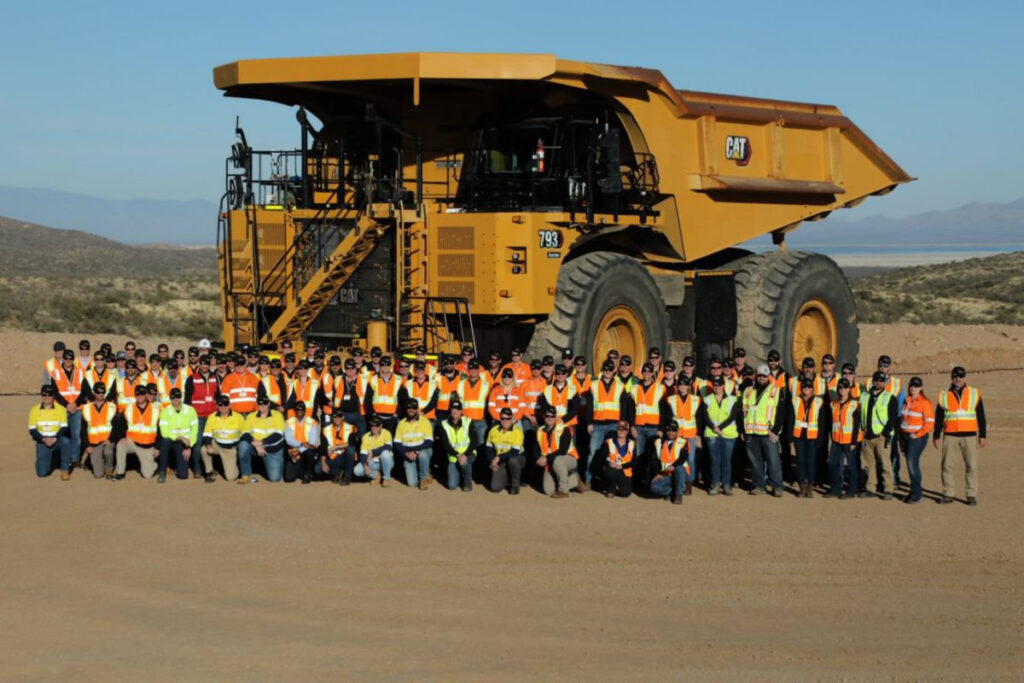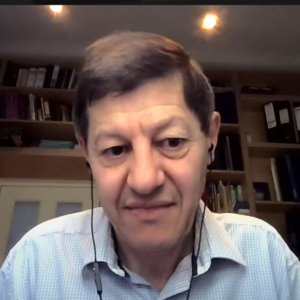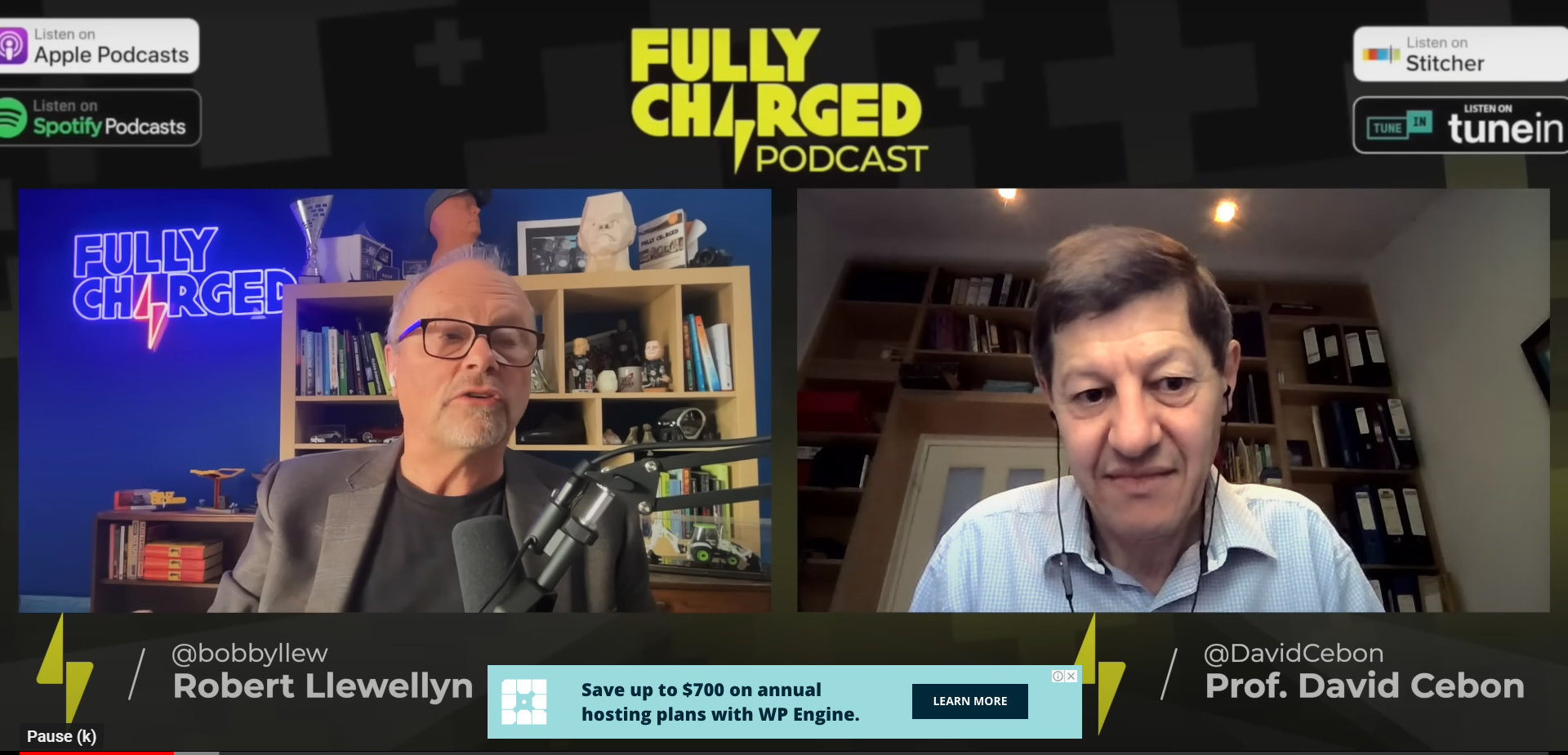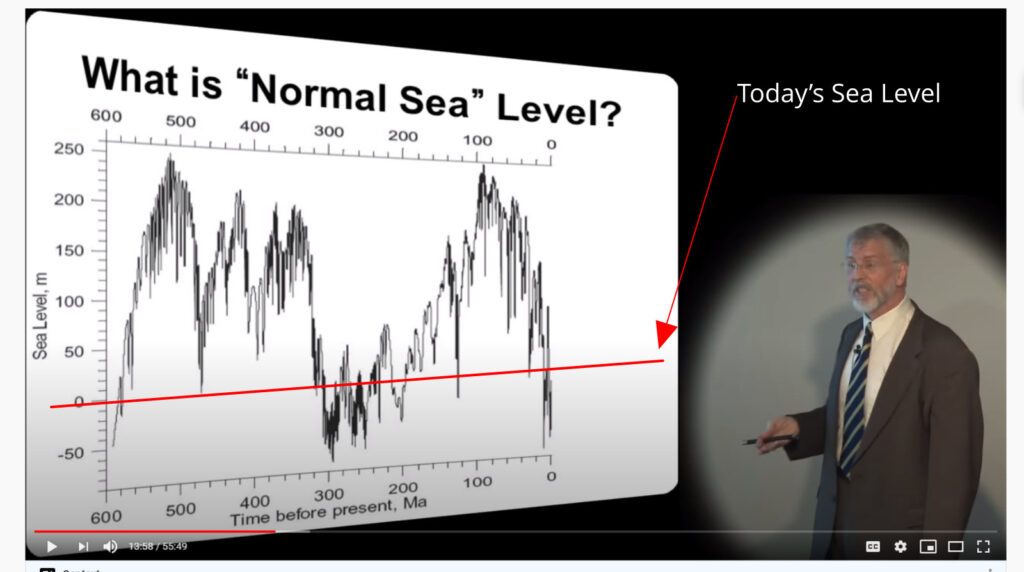How Clean Is Hydrogen For Powering Cars & Buses?
A Few People Think It Is The Future… (Primarily Those Already In The Hydrocarbon Business i.e. Big Oil & Gas)
In this podcast on YouTube Robert Llewellyn talks with Prof. David Cebon who explains in plain English why only very poorly informed people think hydrogen will play a major role in the reducing vehicle and heating carbon emissions.
Prof. Cebon is not sponsored by any hydro-carbon producers instead he relies on facts not fiction to explain why hydrogen will not be used in gas boilers in the future. (If there is any case for hydrogen it will be the very rare exception and not the norm.) The UKs gas infrastructure which has a reported value of £40billion pounds will become in time obsolete. Spoiler Alert. Electric powered heat pumps will in time replace gas boilers. Prof. Cebon explains why.
Transport a few companies like JCB are betting on hydrogen as the future to power vehicles. Again Prof. Cebon explains why if cost is of any concern why electric is much cheaper than hydrogen.
Buses which run on hydrogen are 6 times more expensive per mile than electric buses. Again if cost is of any concern hydrogen is an interesting idea which just does not stack up when an accountant gets involved.
Just over an hour long this information deserves sharing as a number of councils in the UK including Birmingham Council which has a reputation for making very questionable decisions are investing public money in hydrogen.
How Clean is Hydrogen, Actually? With Prof. David Cebon | The PLUS Podcast
Learn more about Prof. David Cebon
For those who think hydrogen is the future. (Do not confuse me with the facts I have already made my mind up.)
If you are interested in reducing carbon emissions whilst not wanting to wear a hair shirt Fully Charged provides cutting edge information in an entertaining way across a wide range of technologies.
Fully Charged podcast with Paul Martin and Why Canada Is Nailing Renewables. 1 hour 20 minutes.
Prefer Your Information In Smaller Digestible Chunks?
Lars is a Danish chap who being Danish is very keen to improve the environment but does not go around spoiling other people;s lives, instead on his YouTube Best In Tesla channel his cranks out videos which explain the virtues of EV’s and similar ideas.
In this video Lars explains in plain English why only someone being generously sponsored by a fossil fuel company would think that hydrogen will be used in the future of vehicles or for heating systems.
Action – I contacted West Midlands Mayor Mr Andy Street and got this reply via one of his colleagues. I think most sane people realise hydrogen in not going to the UKs saviour and I have e removed the next two sections of this page.
In this video the presenter uses buckets to explain visually why hydrogen is NOT the answer to vehicle propulsion. If after watching this video and you still think hydrogen is the answer to vehicle propulsion instead of batteries, try watching the video again.
Hindsight is a wonderful thing – Why did not Nokia see the smartphone coming? Why did not Kodak see the digital camera coming (they did invent it!). Why do some people think hydrogen will be the next source of power for vehicles? (Spoiler alert – it will not be.)
In This Video Tony Seba explains why disruptive technology usually sends the incumbent companies bankrupt and the new entrants eat their lunch…
Sorry the sound quality is not great, but look and listen beyond that, and this will remind you why some of the largest car companies on the planet will not be here in 10-years time and Tesla will almost certainly be the largest and most profitable.
In Part Two, Tony Seba explains why new petrol (aka gas) or diesel vehicles will become museum pieces in the next 10-years.
Sorry the sound quality is not great. For those interested in the punchline before they watch something hydrogen vehicles will not be in the equation. Battery powered vehicles will dominate the market. The variation will be in what kind of battery you will have in your vehicle. The high acceleration type or the it gets me there quick enough.
For those who still think hydrogen is the answer Tony Seba explains that clean electricity will be very cheap. Solar is already cheap and becoming cheaper, couple that with wind turbines and batteries, and this combination could supply all our needs. Who would not be in favour? Large fossil fuel suppliers and those sponsored by them (aka politicians).
From time to time Elon Musk throws out a comment such “as a solar panel farm 100 miles by 100 miles” (10,000 square miles) could supply all of Americas needs. Amazingly this is true.
In reality you would not build just one giant solar farm, but would spread that out around any country, but with batteries and wind added to the mix Tony Seba explains that this is far from fantasy economics and is a genuinely viable solution even in countries well away from the equator.
Whilst on the subject of batteries, with some imagination a sand battery can be used to store heat. You basically build a large silo, run wires through that. Heat it up when electricity is cheap (at night for example), then when you want the heat, you have pipes running through the sand, which takes the heat away. Already working in Finland.

Fully loaded this truck weighs in around 400 tonnes. More details re the Caterpillar 793 EV
This video shows the first deliveries of the Tesla Semi (HGV or Articulated lorry) truck. Not the first electric truck but the first which can do 500 miles on one charge fully loaded. Whilst initially production numbers will be low, demand will be enormous.
This truck has 3 drive motors each one is small and sufficiently light that they can be carried. By the end of 2024 Tesla hopes to be building around 1000 per week.
Q. Does it matter whether the world chooses hydrogen or batteries powered by renewables?
A. If the world wants to slow climate change then reducing fossil fuel usage and increasing the use of renewables to reduce the amount of carbon dioxide in the atmosphere is essential. Clearly using renewables as efficiently as possible makes the most sense.
I have always been fascinated by geography / geology. The fact that the land moves a few millimetres per year and over millions of years that equates to the Himalayas and so on.
In this video Dan Brit explains why sea level is not a constant. Many people think it is. Sea level has been rising for the last 25,000 years What causes the earth’s temperature to change? Dan explains why when any serious scientists looks at the data the amount of carbon in the atmosphere is a key ingredient of the temperature on our planet. The more carbon the warmer the planet




